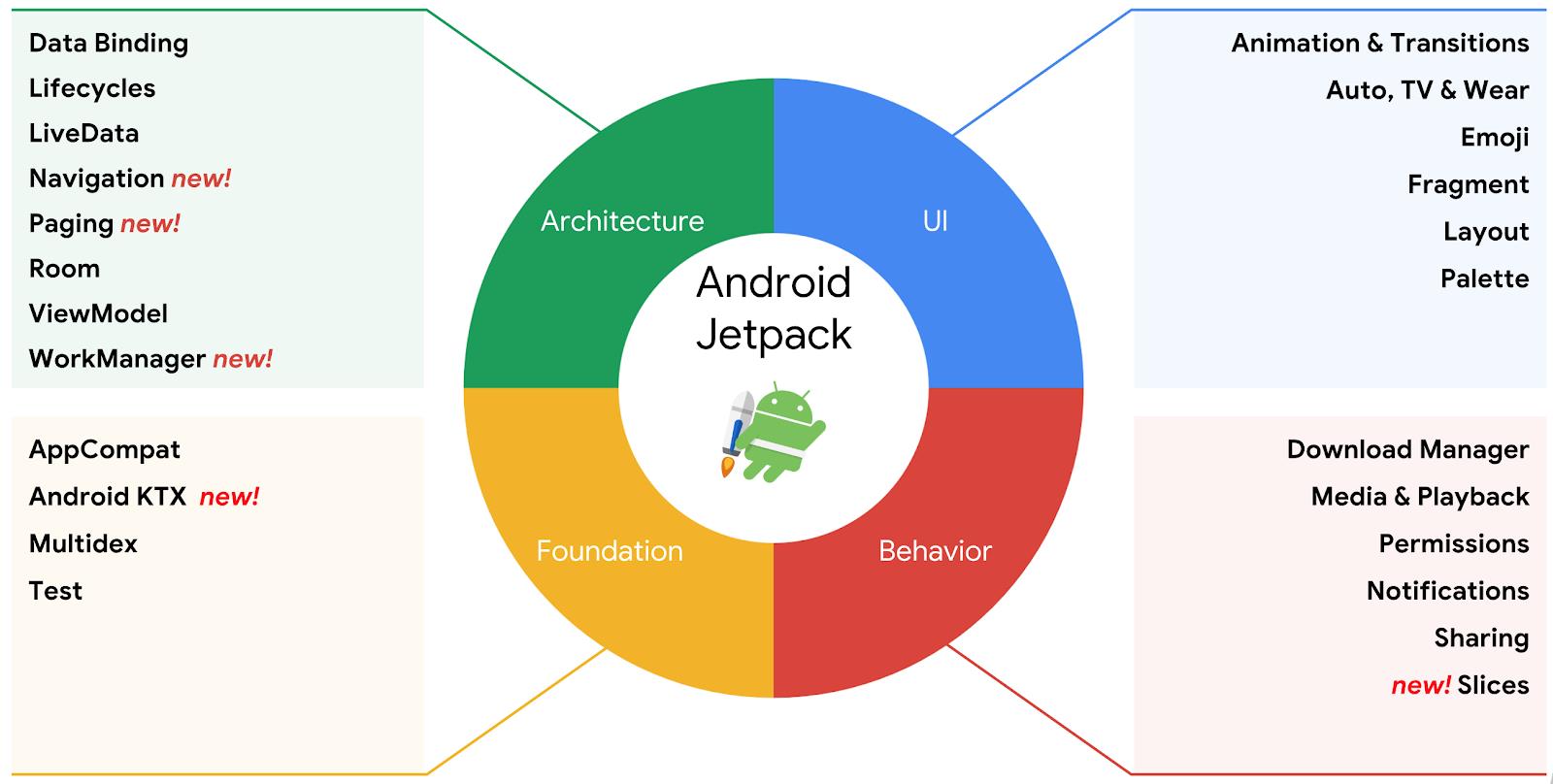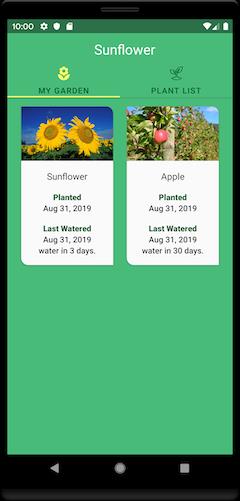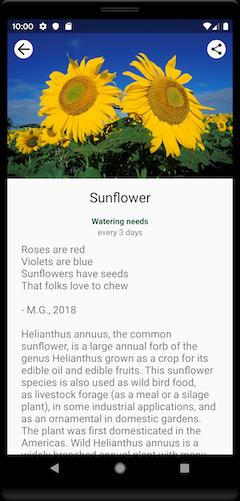基于Sunflower演示项目学习下目前的Android Jetpack架构最佳实践
Posted offbye
tags:
篇首语:本文由小常识网(cha138.com)小编为大家整理,主要介绍了基于Sunflower演示项目学习下目前的Android Jetpack架构最佳实践相关的知识,希望对你有一定的参考价值。
Sunflower项目是google发布的android kotlin Demo项目,展示了使用Jetpack架构开发App的最佳实践),这个项目是持续更新的,第一次提交是2017.8,2021年6月还在更新,我的代码是7月下载的。 里面主要介绍google 最新的一些工具和理念,使用databinding,viewModel,liveData实现MVVM架构, 使开发者可以快速构建自己的APP项目,具体源码:https://github.com/googlesamples/android-sunflower
项目的就是个简单的花园demo, 包括我的花园,植物目录,植物详情,分享等页面,基于kotlin MVVP架构实现,



一、主要技术
1、MVVM 利用databinding,viewModel,liveData实现MVVM架构,
2、利用navigation框架做导航,APP只有一个Activity,其余的都是Fragment
二、具体说明
1、界面实现
首先看看manifest文件
<application
android:name=".MainApplication"
android:allowBackup="true"
android:icon="@mipmap/ic_launcher"
android:label="@string/app_name"
android:roundIcon="@mipmap/ic_launcher_round"
android:supportsRtl="true"
android:theme="@style/Theme.Sunflower">
<activity
android:name=".GardenActivity"
android:theme="@style/Theme.Sunflower.NoActionBar">
<intent-filter>
<action android:name="android.intent.action.MAIN" />
<category android:name="android.intent.category.LAUNCHER" />
</intent-filter>
</activity>
<provider
android:name="androidx.work.impl.WorkManagerInitializer"
android:authorities="$applicationId.workmanager-init"
tools:node="remove" />
</application>
主Activity:GardenActivity 加载了一个布局
<layout
xmlns:android="http://schemas.android.com/apk/res/android"
xmlns:app="http://schemas.android.com/apk/res-auto">
<androidx.fragment.app.FragmentContainerView
android:id="@+id/nav_host"
android:name="androidx.navigation.fragment.NavHostFragment"
android:layout_width="match_parent"
android:layout_height="match_parent"
app:defaultNavHost="true"
app:navGraph="@navigation/nav_garden" />
</layout>
有个来封装其实没啥用,因为没有使用Binding的内容,可以去掉
这里用到Navigation,我们来看看nav_garden
//使用navigation来包装,加载两个fragment app:startDestination设置主界面
<navigation xmlns:android="http://schemas.android.com/apk/res/android"
xmlns:app="http://schemas.android.com/apk/res-auto"
xmlns:tools="http://schemas.android.com/tools"
app:startDestination="@+id/view_pager_fragment">
//主fragment
<fragment
android:id="@+id/view_pager_fragment"
android:name="com.gl.samples.apps.sunflower.HomeViewPagerFragment"
tools:layout="@layout/fragment_view_pager">
<action
android:id="@+id/action_view_pager_fragment_to_plant_detail_fragment"
app:destination="@id/plant_detail_fragment"
app:enterAnim="@anim/slide_in_right"
app:exitAnim="@anim/slide_out_left"
app:popEnterAnim="@anim/slide_in_left"
app:popExitAnim="@anim/slide_out_right" />
</fragment>
//详情页
<fragment
android:id="@+id/plant_detail_fragment"
android:name="com.gl.samples.apps.sunflower.PlantDetailFragment"
android:label="@string/plant_details_title"
tools:layout="@layout/fragment_plant_detail">
<argument
android:name="plantId"
app:argType="string" />
</fragment>
</navigation>
这个也不难,HomeViewPagerFragment主界面,PlantDetailFragment植物详情页,具体内容可以去了解下Navigation
HomeViewPagerFragment 主要是一个viewPager,包含两个Fragment :GardenFragment和 PlantListFragment
class SunflowerPagerAdapter(fragment: Fragment) : FragmentStateAdapter(fragment)
/**
* Mapping of the ViewPager page indexes to their respective Fragments
*/
private val tabFragmentsCreators: Map<Int, () -> Fragment> = mapOf(
MY_GARDEN_PAGE_INDEX to GardenFragment() ,
PLANT_LIST_PAGE_INDEX to PlantListFragment()
)
override fun getItemCount() = tabFragmentsCreators.size
override fun createFragment(position: Int): Fragment
return tabFragmentsCreators[position]?.invoke() ?: throw IndexOutOfBoundsException()
viewPager适配器SunflowerPagerAdapter中定义一个map,在创建Fragment的时候通过反射来执行构建Fragment的方法。
这里要注意viewPager和我们以前使用的viewPager并不是一个东西,而是在androidx.viewpager2.widget里面的新的类,主要通过RecyclerView来实现,适配器当然
也是继承RecyclerView.Adapter实现的,具体实现请查看源码,具体不细说。
GardenFragment和 PlantListFragment里面就比较简单,运用DataBinding来把数据绑定到View上,实现数据变化view改变,ViewModel来处理和管理数据,并进行数据通信。
这个里面涉及到的内容比较复杂,可以查看我另一个源码,比较简单的介绍DataBinding和ViewModel的用法,传送门
2、数据加载
这个应用可以说是一个离线应用(数据离线,图片加载不是),主要的数据都是存储在plants.json,于是需要把内容都加载出来:
package com.google.samples.apps.sunflower.workers
import android.content.Context
import android.util.Log
import androidx.work.CoroutineWorker
import androidx.work.WorkerParameters
import com.google.gson.Gson
import com.google.gson.reflect.TypeToken
import com.google.gson.stream.JsonReader
import com.google.samples.apps.sunflower.data.AppDatabase
import com.google.samples.apps.sunflower.data.Plant
import kotlinx.coroutines.Dispatchers
import kotlinx.coroutines.withContext
class SeedDatabaseWorker(
context: Context,
workerParams: WorkerParameters
) : CoroutineWorker(context, workerParams)
override suspend fun doWork(): Result = withContext(Dispatchers.IO)
try
val filename = inputData.getString(KEY_FILENAME)
if (filename != null)
applicationContext.assets.open(filename).use inputStream ->
JsonReader(inputStream.reader()).use jsonReader ->
val plantType = object : TypeToken<List<Plant>>() .type
val plantList: List<Plant> = Gson().fromJson(jsonReader, plantType)
val database = AppDatabase.getInstance(applicationContext)
database.plantDao().insertAll(plantList)
Result.success()
else
Log.e(TAG, "Error seeding database - no valid filename")
Result.failure()
catch (ex: Exception)
Log.e(TAG, "Error seeding database", ex)
Result.failure()
companion object
private const val TAG = "SeedDatabaseWorker"
const val KEY_FILENAME = "PLANT_DATA_FILENAME"
主要在SeedDatabaseWorker类中,主要使用的是WorkManager这个框架来实现异步加载,加载后把数据存入room数据库,便于后续使用。
CoroutineWorker是Worker的子类,一般在使用Kotlin开发的时候使用来和协程配合开发,
看这部分代码可以先去学习下WorkManager,
3、网络请求
主要是获取植物的图片url, 基于okhttp3和retrofit2框架实现
图片的加载使用glide, 这几个框架都是安卓开发的主流框架
package com.google.samples.apps.sunflower.api
import com.google.samples.apps.sunflower.BuildConfig
import com.google.samples.apps.sunflower.data.UnsplashSearchResponse
import okhttp3.OkHttpClient
import okhttp3.logging.HttpLoggingInterceptor
import okhttp3.logging.HttpLoggingInterceptor.Level
import retrofit2.Retrofit
import retrofit2.converter.gson.GsonConverterFactory
import retrofit2.http.GET
import retrofit2.http.Query
/**
* Used to connect to the Unsplash API to fetch photos
*/
interface UnsplashService
@GET("search/photos")
suspend fun searchPhotos(
@Query("query") query: String,
@Query("page") page: Int,
@Query("per_page") perPage: Int,
@Query("client_id") clientId: String = BuildConfig.UNSPLASH_ACCESS_KEY
): UnsplashSearchResponse
companion object
private const val BASE_URL = "https://api.unsplash.com/"
fun create(): UnsplashService
val logger = HttpLoggingInterceptor().apply level = Level.BASIC
val client = OkHttpClient.Builder()
.addInterceptor(logger)
.build()
return Retrofit.Builder()
.baseUrl(BASE_URL)
.client(client)
.addConverterFactory(GsonConverterFactory.create())
.build()
.create(UnsplashService::class.java)
总结:
Sunflower这个应用主要的技术包括:DataBinding、ViewModel、LiveData、Navigation、WorkManager和Room,
当然还有一些简单的Android的知识和协程的内容,把这个应用过一遍,对自己也很有帮助。
以上是关于基于Sunflower演示项目学习下目前的Android Jetpack架构最佳实践的主要内容,如果未能解决你的问题,请参考以下文章